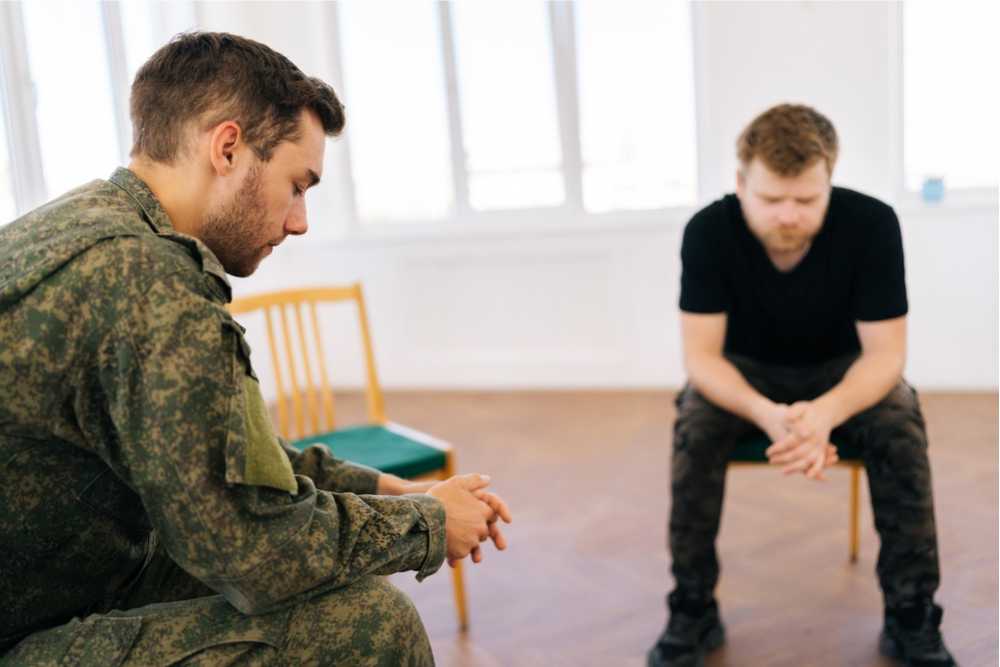The emotional and traumatic experiences of military life can naturally lead to an unexpected and profound sense of emptiness that can catch veterans off guard. After years of structured purpose, clear mission objectives, and intense camaraderie, many service members find themselves adrift in a world that suddenly feels isolating. The emptiness feeling after military service is often compounded by the challenge of transitioning military skills and experiences into civilian roles, often leaving veterans feeling undervalued or uncertain about their place in the world they’re now expected to seamlessly reintegrate into.

What Does It Mean to Feel Empty After Leaving the Military?
Feeling empty after leaving the military is a profound psychological experience encompassing the loss of identity, purpose, and structure that defines every aspect of military life. This emptiness manifests as a deep sense of disconnection from the person you once were and uncertainty about who you’re supposed to become in civilian society.
The military provides a career and a complete framework for living—clear hierarchies, defined missions, daily routines, and an unshakable sense of belonging to something larger than yourself. When that framework disappears overnight, veterans often describe feeling like they’re floating in a void, stripped of the institutional identity that gave their lives meaning and direction.
Research shows that veterans frequently struggle with the lack of structure in civilian life, which can feel overwhelming after years of highly regimented existence. The emptiness is particularly acute because military service demands total commitment. It shapes not just what you do but who you are. Veterans may find themselves mourning the loss of their military identity while simultaneously struggling to construct a new civilian one. This internal conflict creates a unique form of grief, as you’re essentially mourning the death of a version of yourself while trying to figure out how to live as someone else.
The emptiness also stems from the stark contrast between the high-stakes, mission-critical environment of military service and what can feel like the trivial concerns of civilian life. After experiencing the intensity of combat, life-or-death decisions, or missions that directly impact national security, everyday civilian challenges can feel meaningless.
Veterans often report feeling like they’re living in slow motion or that nothing in civilian life carries the same weight or urgency as their military experiences. This disconnect can leave them feeling isolated and misunderstood, contributing to a persistent sense that they no longer fit anywhere, leading to numerous veterans needing depression treatment to cope with the new life.
Why Do Veterans Often Experience Emotional Numbness?
Veterans often experience emotional numbness as a psychological defense mechanism developed during military service and trauma exposure. This numbness serves as the mind’s way of protecting itself from overwhelming emotions that could be dangerous or counterproductive in high-stress military environments.
The numbness typically develops through repeated exposure to traumatic events, life-threatening situations, and the necessity to remain functionally effective despite witnessing or experiencing horror. In combat zones or other military operations, soldiers must suppress natural emotional responses to death, violence, and loss to continue their missions and protect their units. Over time, this emotional suppression becomes an automatic response that doesn’t simply turn off when they return to civilian life.
Veterans struggle with emotional numbness long after their service ends, often as part of PTSD. This numbness manifests as an inability to feel positive emotions like joy, love, or excitement, even in situations where these feelings would be natural and appropriate. Veterans struggling with PTSD may find themselves going through the motions of civilian life without truly connecting to experiences that once brought them happiness or meaning.
The numbness also serves as protection against feeling the full weight of their military experiences. Processing the grief, guilt, anger, and trauma from service can feel so overwhelming that the mind simply shuts down emotional processing altogether. Unfortunately, while this emotional shutdown may have been adaptive during service, it creates significant barriers to forming meaningful relationships and finding fulfillment in civilian life, often leaving veterans feeling isolated and disconnected from the world around them.
Can Feelings of Emptiness Be Linked to Depression or PTSD?
Yes, feelings of emptiness in veterans are often connected with depression and PTSD, creating a complex web of emotional and psychological symptoms. The emptiness associated with these conditions manifests as a feeling of disconnection from self and others and a sense of numbness and nothingness, which is frequent and reduces functional capacity.
- Specific feelings of emptiness linked to depression include a persistent void where positive emotions once existed.
- Feelings of emptiness connected to PTSD-related emptiness stem from trauma’s impact on the nervous system and emotional processing.
- Common overlapping feelings of emptiness encompass feelings of loneliness, sadness, or feeling numb or disconnected.
Mental Health Treatment That Works
Call 949-625-0564What our customers are saying
What Are the Most Common Emotional Challenges After Military Separation?
The transition from military to civilian life presents a complex array of emotional hurdles that can catch even the most prepared veterans off guard. These challenges stem from the profound shift in identity, purpose, and social structure that defines post-military life:
- Loss of Identity and Purpose: One of the most devastating emotional challenges veterans face is the complete upheaval of their sense of self.
- Social Isolation and Relationship Difficulties: Veterans frequently struggle with profound loneliness as they attempt to reconnect with civilian life.
- Emotional Numbness and Disconnection: Many veterans experience a persistent emotional flatness that makes it difficult to feel joy, excitement, or even sadness in appropriate situations.
- Hypervigilance and Anxiety: The constant state of alertness required in military environments, particularly in combat zones, often persists long after service ends.
- Guilt and Survivor’s Remorse: Many veterans struggle with complex feelings of guilt related to their service experiences.
- Anger and Irritability: Unpredictable anger and irritability are common emotional challenges that can strain relationships and create additional stress.
- Depression and Hopelessness: The combination of identity loss, social isolation, and adjustment difficulties often culminates in clinical depression, requiring long-term treatment for suicidal thoughts.

Key Takeaways for Managing Emptiness Feeling After Military
- Identity Crisis is central to veteran struggles.
- Emotional numbness is a protective mechanism gone wrong.
- Social isolation stems from unbridgeable experience gaps.
- Purpose loss creates existential emptiness.
- Hypervigilance and anger reflect ongoing trauma responses.
- Depression often represents the culmination of multiple struggles.
Seeking professional mental health treatment is crucial for veterans experiencing emptiness after military service because this complex emotional state requires specialized understanding and evidence-based programs that go far beyond what friends, family, or self-help approaches can provide. Moment of Clarity in Southern California provides mental health professionals trained in military culture and trauma who can help veterans understand that their feelings of emptiness are a normal response to an extraordinary life transition, not a personal failing or weakness.
To access professional outpatient mental health care for veterans, call Moment of Clarity at 949-625-0564 today.
Resources
- U.S. Department of Veterans Affairs – Common Challenges During Re-adjustment to Civilian Life
- Journal of Veterans Studies – The Military to Civilian Transition: Exploring Experiences of Transitions to ‘Civvy Street’ and Implications for the Self
- Pew Research Center – Readjusting to civilian life




